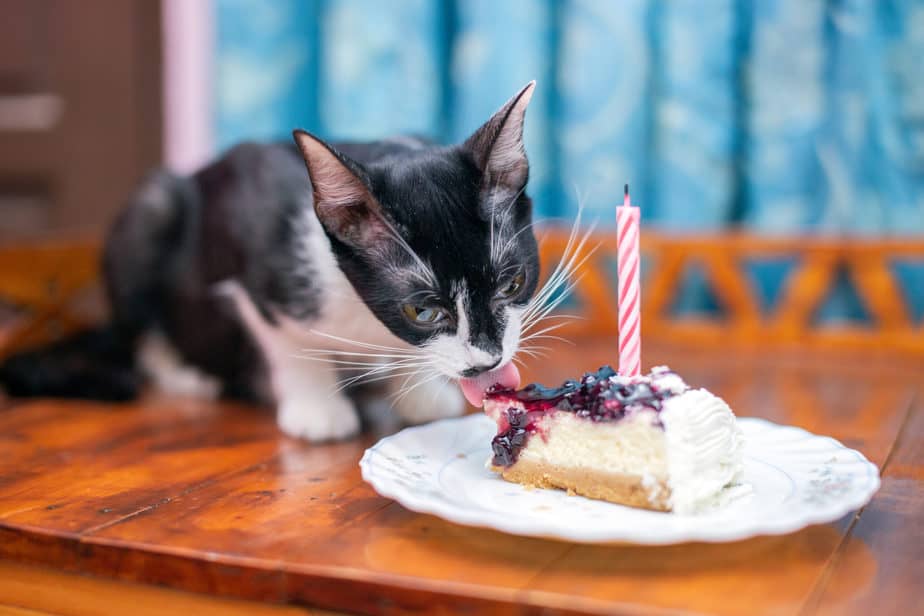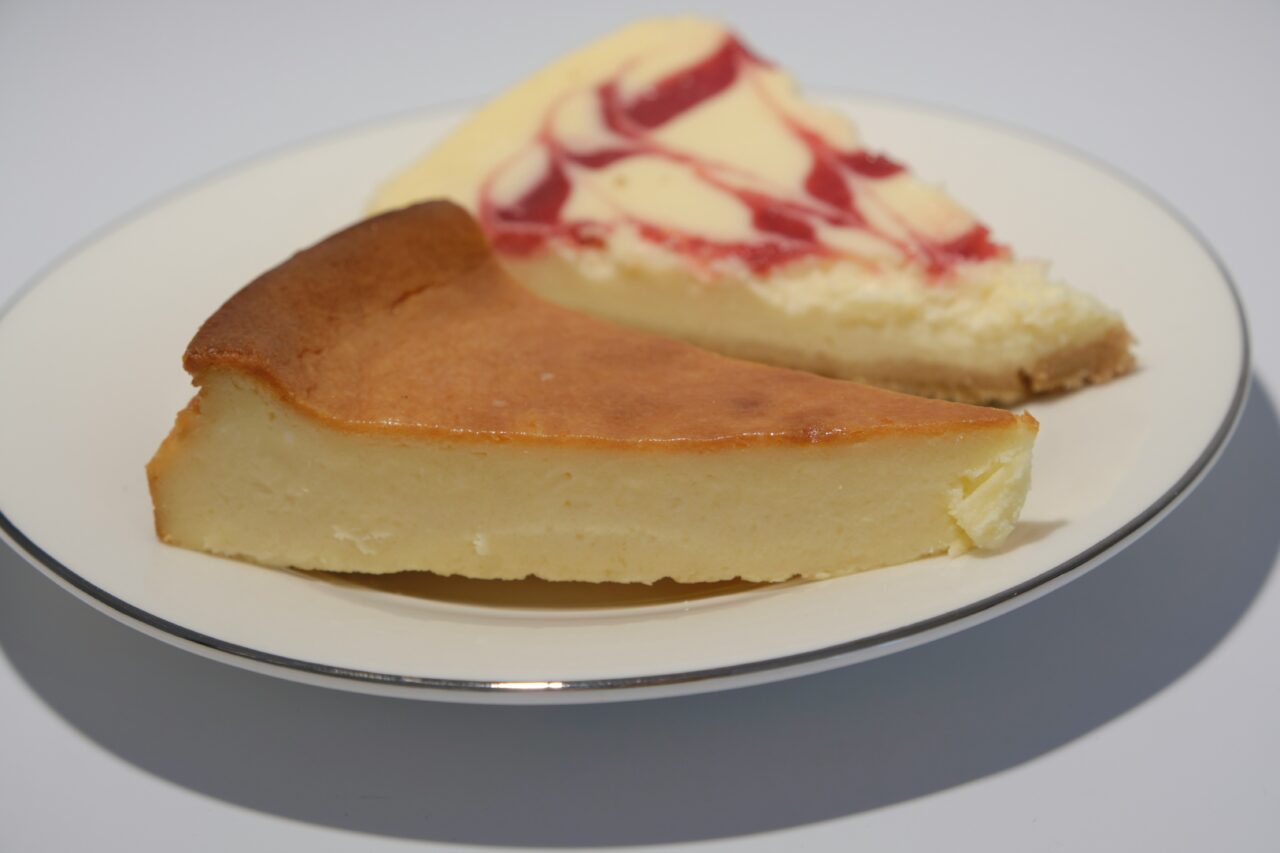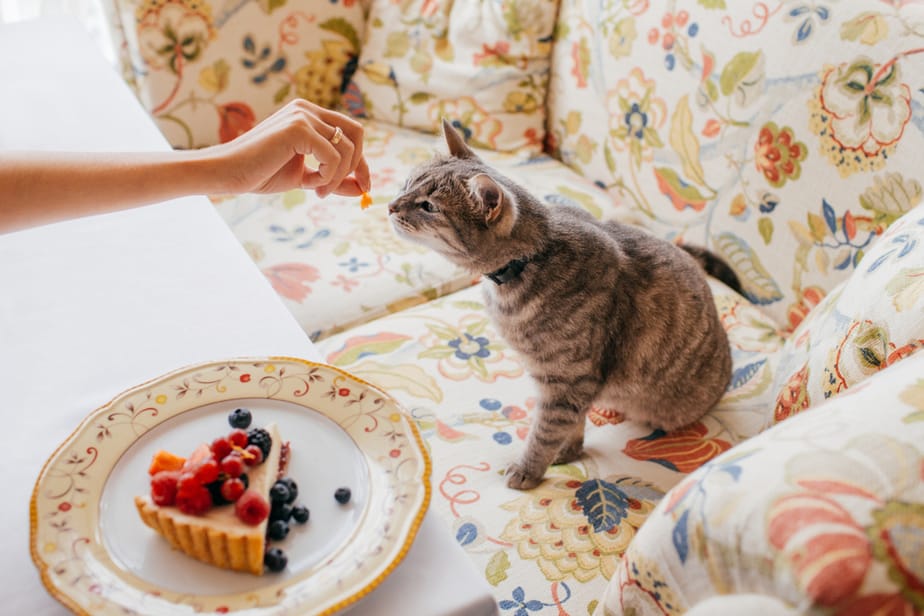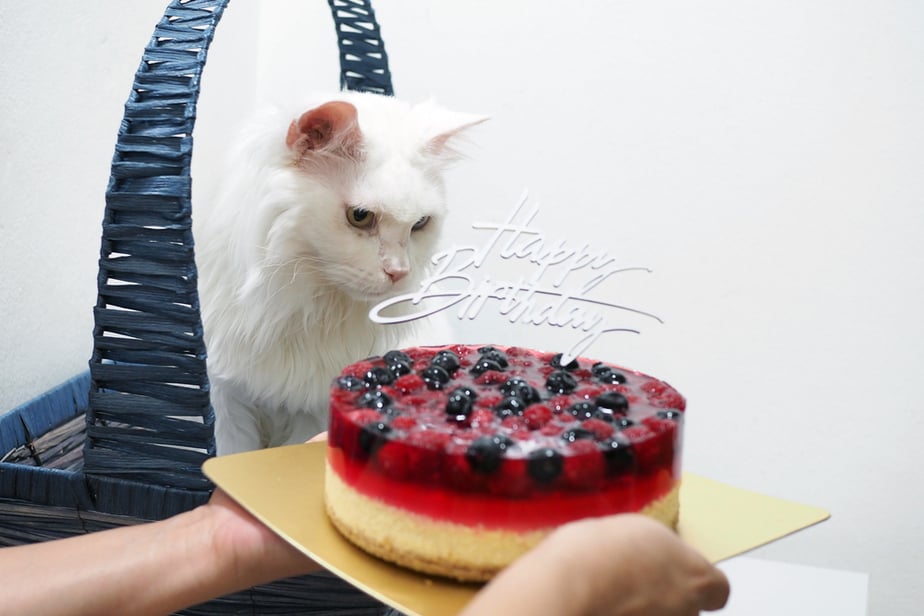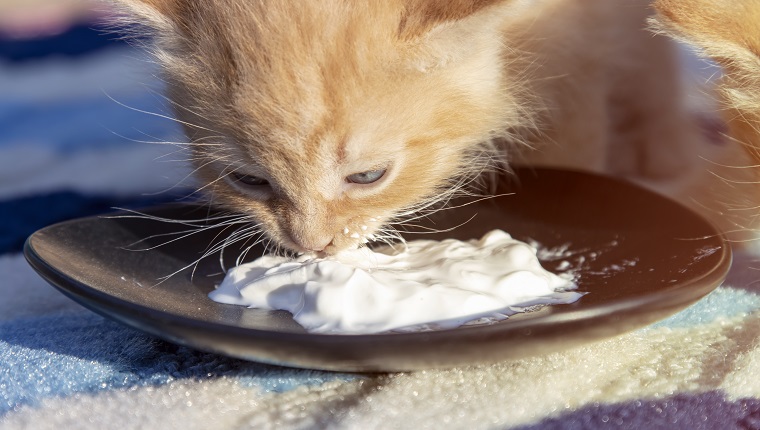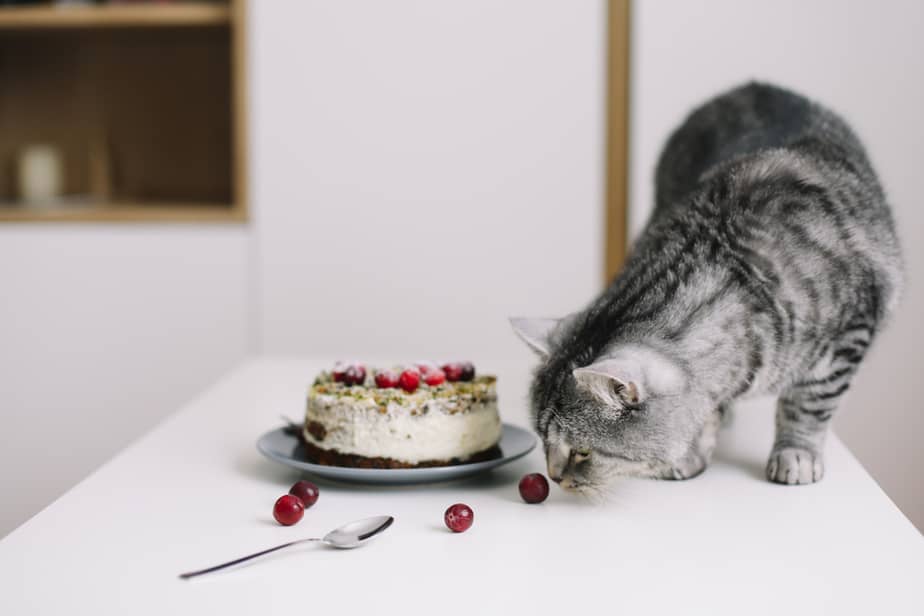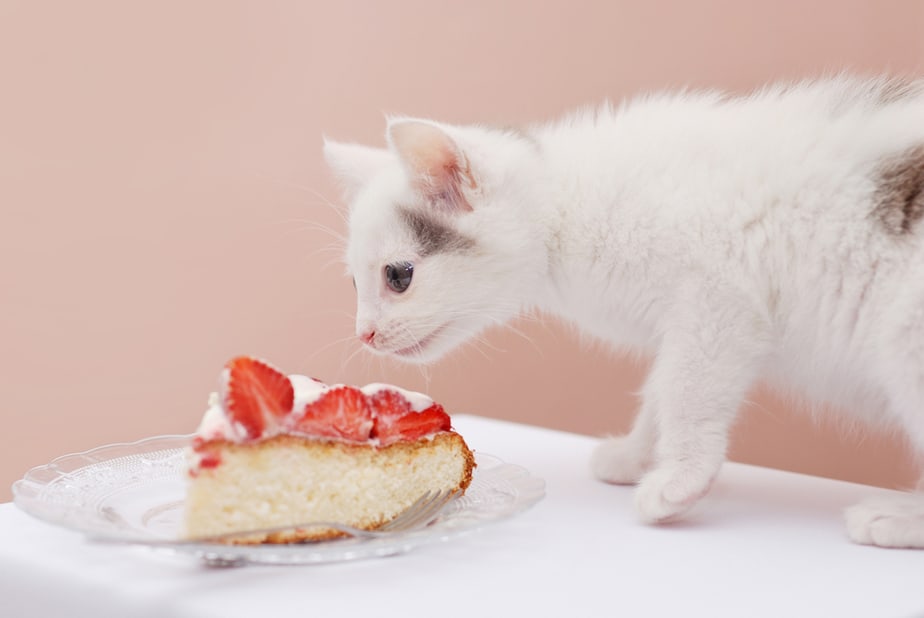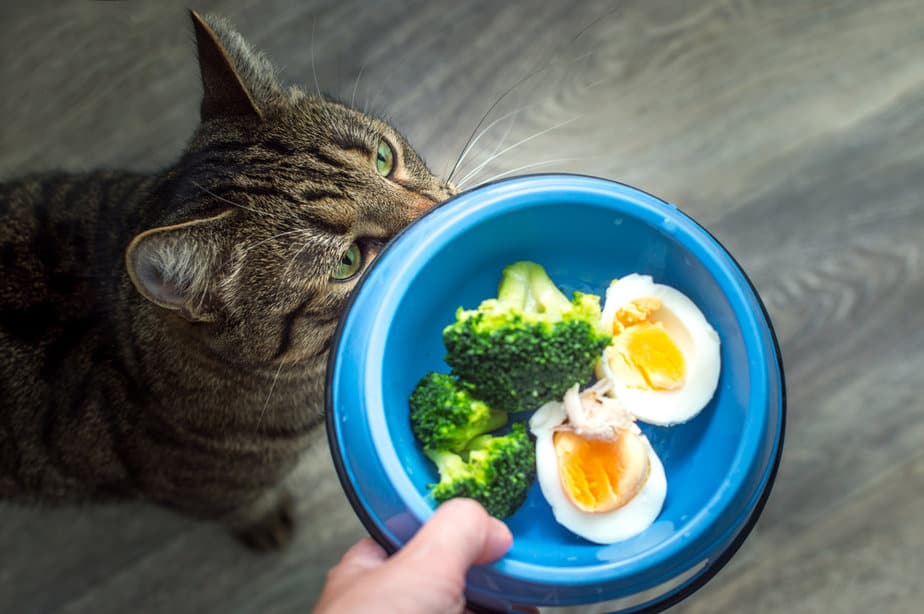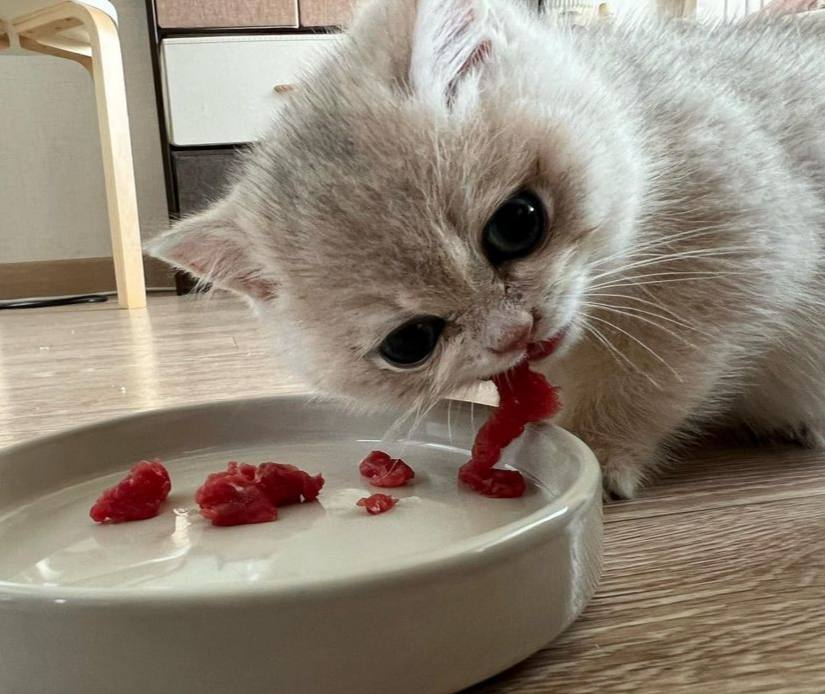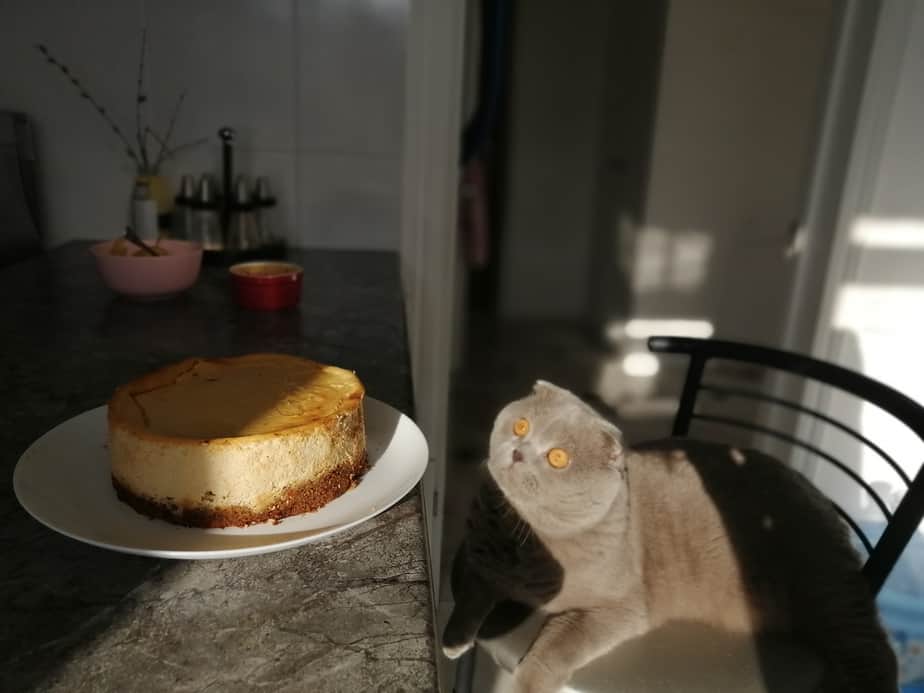📖 Table of Content:
Can cats eat cheesecake? If yes, this would mean no more beef between you and your cat when it comes to this treat. Their relentless begging, be it silent or loud, for a piece of your cheesecake can be tiring. Cats are usually picky-eaters, but once they see something they want, their determination will always win.
Humans eat cheesecake occasionally, which means that it’s either an unnecessary part of their diet or unhealthy. When it comes to cats, they have a body that’s built differently from humans’. This means they don’t process foods the same way as we do.
Is cheesecake safe for cats?
A few bites of this treat every once in a while won’t cause harm to felines. However, you shouldn’t make this a regular thing. Cheesecake is full of ingredients that aren’t the best choice for your cat.
Moreover, this delicacy has many flavors and is often combined with lots of other foods that could be harmful to your pet. So, a few bites on rare occasions are safe, but don’t go filling up your cat’s bowl with this treat.
Do cats like cheesecake?
“Can cats eat cheesecake?” and “Do cats even like the taste of it?” are two questions that go hand in hand. And here are your answers.
From my experience, cats take delight in cheesecake. We like it because of its sweet and tangy flavor, but this isn’t the case with cats.
They can’t taste sweetness. Shocking, right? Felines are incapable of detecting the flavor because they lack certain taste buds.
This is due to them being carnivores, which means they are equipped with required taste buds that detect protein and fat. This leads us to the conclusion that sugar is unnecessary in their diet. And in the case of cheesecake, we’re talking of a high concentration of sugar.
Therefore, it isn’t the carbs that attract cats in cheesecake. It’s rather the fat content this treat possesses. You are more likely to find your cat licking away the creamy part than the toppings.
So, cats not having a soft spot for sugar is actually good news.
Regular intake of this carbohydrate can cause medical issues in cats. Felines are prone to becoming overweight from carbs, which furthermore results in joint pain. Other than that, regular sugar intake can bring dental problems, such as tooth decay.
Can cats eat cheesecake because of cream cheese?
The creamy and smooth texture of cheesecake can be attributed to its main ingredient, cream cheese. The full-fat cream cheese is what gives this cake its texture and richness in flavor.
Cream cheese isn’t toxic to cats but can cause some digestive problems.
It’s a dairy product which means it contains lactose. Cats are lactose intolerant, which means they have a hard time breaking down the sugar from dairy products.
Felines lack certain intestinal enzymes that would help them digest this compound (lactase) and this can result in stomach upset, which can lead to diarrhea and vomiting.
Cream cheese is higher in fat than other dairy products. Cats need fat intake daily as it’s an important component in their diet. However, this type of fat contained in cream cheese isn’t most fitting for their needs. Felines require unsaturated fat that serves as an energy source.
Fat found in cream cheese and cheesecake is highly saturated, which is an unhealthy type of fat. Too much of this can lead to high cholesterol levels, and we all know what that means – increased risk of heart disease.
Besides, your cat can put on some extra pounds, and if your pet is already a chonky, that’s the last thing you want.
Sour cream
This is another ingredient found in cheesecake. It’s similar to cream cheese because they are both dairy products. Having established that cats are lactose intolerant, you can guess some of the consequences of feeding your cat sour cream.
Sour cream isn’t toxic to cats, just like cream cheese. The same goes for both of these products because they don’t play any part in a feline’s diet. A few licks here and there won’t hurt, but it’s best to avoid it if possible.
Sugar content in cheesecake
We have already touched on sugar and its impact on cats. However, the amount found in cheesecake isn’t alarming and isn’t likely to cause immediate harm. It isn’t recommended, but we all know we will sometimes give in to our cats’ pleas.
Sugar is mainly used to balance out the tangy flavor of cheesecake, so the sugar content in this treat isn’t alarming.
Risks of cheesecake: lemon juice and vanilla extract
While lemon and vanilla add zest and aroma to this treat, they are unfortunately poisonous to felines.
Lemon juice is required for the tangy flavor in the cheesecake. Lemon is a citrus fruit and these are known to be toxic to felines because of the essential oils they contain. Limonene and linalool are the culprits in citrus foods that can make your feline experience some gastrointestinal upset.
Citrus can also irritate her skin, leading to the development of allergic dermatitis. Citrus poisoning can be recognized through vomiting, diarrhea, weakness, and trembling.
Fruits like lime, oranges, and lemon are often used as a cat deterrent. The strong smell is repelling to them and people resort to these fruits to keep their plants and gardens safe of their pe(s)ts.
Vanilla extract is dangerous to cats because it contains ethyl alcohol. Even small amounts of it can cause alcohol poisoning in felines. Artificial vanilla isn’t any less dangerous as it, too, contains ethyl alcohol. In fact, it can be even more dangerous because it has many other chemicals that are potentially harmful to your feline.
Vanilla-flavored treats shouldn’t be as much of a worry because of other ingredients that subdue vanilla extract. But, it’s better to play on the safe side.
So, if making cheesecake yourself, make sure you keep these ingredients far from your furbaby’s reach. And if your cats eat too much cheesecake, you may want to look out for the signs of stomach distress.
Can cats eat eggs?
Eggs are an excellent source of protein. Cats rely on protein intake to function daily and without it, they can become underweight and develop certain health conditions. Felines require animal-derived protein for proper growth and it also serves as an energy source.
Eggs can be a great snack from time to time and adding them to your cat’s regular diet can benefit her greatly. However, make sure your cat doesn’t indulge in some raw eggs you whisked. These may carry certain diseases like E. coli and salmonella. Plain, boiled eggs are the safe way to go.
Raspberry and strawberry toppings
These fruits are safe for cats’ consumption in fresh forms. They have many health benefits, but some of them are lost during the cooking process.
Toppings also include sugar and lemon juice, which isn’t ideal for your pet. If your cat is fond of these toppings, it isn’t a reason for concern as long as it’s in moderate amounts.
What about chocolate toppings?
Apart from raspberry and strawberry, cheesecake is often topped with chocolate ganache. Chocolate is poisonous to felines even in small amounts. This treat contains caffeine and theobromine that is hard for felines to digest, and build-up thereof can result in intoxication.
Some symptoms of chocolate toxicity include vomiting, diarrhea, as well as increased thirst and urination. Other, more severe signs involve respiratory problems, tremors, and seizures. Dark chocolate is more toxic to cats as it contains higher levels of caffeine and theobromine.
This doesn’t mean that white or milk chocolate, for example, is safe for felines. Pure chocolate that’s used for making chocolate ganache can be fatal to your feline. When choosing cheesecake, make sure it doesn’t contain any chocolate, especially the thick ganache.
